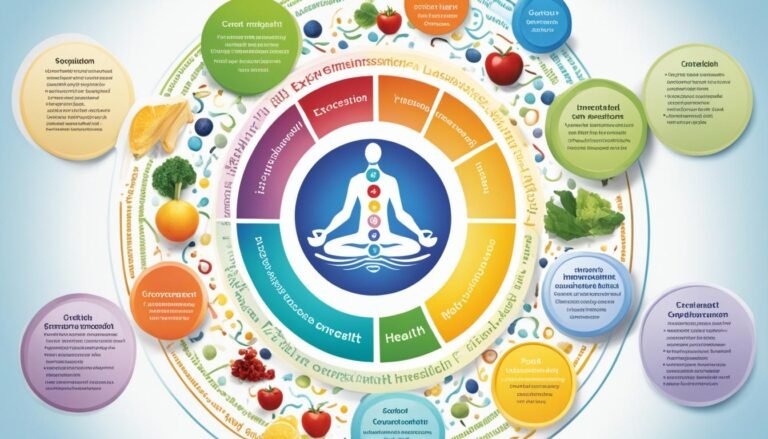What are the 7 Dimensions of Life?
Welcome to an exploration of the 7 dimensions of life, a holistic approach to achieving balance and overall wellness. Each dimension plays a crucial role in shaping our well-being and happiness. By understanding and nurturing these dimensions, you can cultivate a fulfilling and harmonious life.
So, what are the 7 dimensions of life? They are:
- Physical: Taking care of your body through exercise, proper nutrition, and avoiding harmful habits.
- Emotional: Understanding and expressing emotions in a healthy and constructive manner.
- Intellectual: Stimulating your mind through learning, critical thinking, and embracing new experiences.
- Social: Building and maintaining healthy relationships and actively participating in your community.
- Spiritual: Finding meaning, purpose, and inner peace by connecting with your personal beliefs and values.
- Environmental: Being aware of your impact on the environment and making choices that promote sustainability.
- Occupational: Finding satisfaction and fulfillment in your work, and achieving a healthy work-life balance.
Neglecting any one dimension could have adverse effects on your overall well-being, emphasizing the importance of nurturing all aspects of your life. By striving for balance in each dimension, you can create a life of harmony and fulfillment.
Key Takeaways:
- Wellness is the pursuit of balance and growth in the 7 dimensions of life: physical, emotional, intellectual, social, spiritual, environmental, and occupational.
- Nurturing each dimension contributes to overall well-being and quality of life.
- Physical wellness involves exercise, nutrition, and avoiding harmful habits.
- Emotional wellness includes understanding and expressing emotions.
- Intellectual wellness encourages mental stimulation and learning.
Physical Dimension
Physical wellness is a crucial aspect of overall well-being, encompassing behaviors that promote a healthy body and lifestyle. By prioritizing physical wellness, you can enhance your quality of life and reduce the risk of various diseases. This dimension involves incorporating regular exercise, maintaining proper nutrition, and avoiding harmful habits that may hamper your well-being.
Exercise plays a pivotal role in physical wellness as it helps strengthen muscles, improve cardiovascular health, and boost your mood. Engaging in activities such as brisk walking, swimming, or cycling not only improves your physical fitness but also enhances your mental well-being. By dedicating just 30 minutes a day to moderate exercise, you can significantly reduce the risk of chronic diseases such as cardiovascular conditions, diabetes, and certain types of cancer.
Proper nutrition is equally vital for physical wellness. Nourishing your body with a balanced diet rich in fruits, vegetables, whole grains, and lean proteins provides the necessary nutrients for optimal bodily functions. It boosts your immune system, supports healthy weight management, and reduces the risk of chronic conditions. Additionally, staying hydrated by consuming an adequate amount of water throughout the day is crucial for maintaining overall physical health.
Abstaining from harmful habits, such as smoking, excessive alcohol consumption, and substance abuse, is essential for safeguarding your physical well-being. These behaviors can have severe detrimental effects on your health, leading to an increased risk of various diseases and injuries. By making conscious choices to avoid these habits, you can significantly improve your physical wellness.
Recognizing symptoms of disease, attending regular medical checkups, and taking preventative measures are vital components of physical wellness. Regular health screenings and consultations with healthcare professionals allow for early detection and treatment of potential health issues. Moreover, implementing preventive measures, such as vaccinations, practicing safe sex, and protecting yourself from environmental hazards, can contribute to disease prevention and overall well-being.
Ensuring your physical safety is also an essential aspect of physical wellness. Taking precautions to prevent injuries, such as wearing protective gear during sports activities or using proper lifting techniques, reduces the risk of accidents and promotes physical well-being.
By prioritizing physical wellness through exercise, nutrition, disease prevention, and safety measures, you can enhance your overall health and enjoy a higher quality of life.
| Benefits of Physical Wellness | Examples |
|---|---|
| Improved cardiovascular health | Reduced risk of heart disease and stroke |
| Increased strength and flexibility | Enhanced mobility and reduced risk of injuries |
| Healthy weight management | Reduced risk of obesity and related conditions |
| Boosted immune system | Reduced susceptibility to infections and illnesses |
| Enhanced mental well-being | Reduced symptoms of depression and anxiety |
Emotional Dimension
Emotional wellness is a vital aspect of overall well-being. It revolves around understanding and respecting your own feelings and emotions, as well as those of others. By cultivating emotional wellness, you can enhance your self-awareness, form healthier relationships, and effectively manage stress.
Self-awareness is the foundation of emotional wellness. It involves being in tune with your emotions, thoughts, and behaviors. By practicing self-reflection and introspection, you can gain a deeper understanding of your emotional responses and patterns. This self-awareness allows you to make conscious choices that align with your values and needs, leading to a greater sense of fulfillment and emotional stability.
Building and maintaining healthy relationships is another crucial component of emotional wellness. Meaningful connections with family, friends, and partners contribute to feelings of belonging and support. Nurturing these relationships through effective communication, empathy, and trust fosters emotional well-being for both parties involved.
“The quality of our relationships determines the quality of our lives.” – Esther Perel
Stress management is an essential skill for emotional wellness. Everyone experiences stress in their lives, and it’s important to have effective coping mechanisms. Engaging in activities that promote relaxation and self-care, such as meditation, exercise, or engaging hobbies, can help reduce stress levels. Additionally, seeking support from trusted individuals or professionals can provide valuable guidance and perspective during challenging times.
Remember, emotional wellness is an ongoing journey that requires conscious effort and self-reflection. By prioritizing self-awareness, nurturing relationships, and practicing stress management techniques, you can enhance your emotional well-being and lead a more fulfilling life.
| Key Aspects of Emotional Wellness | |
|---|---|
| Self-awareness | Gaining insight into your own emotions, thoughts, and behaviors. |
| Relationships | Cultivating healthy connections, effective communication, and empathy. |
| Stress Management | Utilizing techniques to cope with stress and promote relaxation. |

Spiritual Dimension
The spiritual dimension of wellness is an integral part of your overall well-being. It encompasses your guiding beliefs, principles, or values that provide meaning and purpose in life. By aligning your actions and choices with these beliefs, you can experience a deep sense of fulfillment and contentment.
Seeking harmony within oneself and with the world around you is essential for spiritual wellness. This involves finding balance and peace in your relationships, your work, and your daily experiences. It’s about connecting with something greater than yourself and understanding your place in the universe.
To enhance your spiritual well-being, take the time to explore your spiritual core. Reflect on your beliefs and values, and consider how they shape your decisions and actions. Spend moments alone in quiet contemplation, allowing yourself to connect with your inner self and find answers to life’s deeper questions.
Furthermore, cultivating curiosity and being open to new experiences can also contribute to your spiritual wellness. Embrace a sense of wonder and embrace the world around you, finding beauty and meaning in the smallest of things. By nurturing your spiritual dimension, you can find a sense of purpose and harmony in your life that positively impacts your overall well-being.
FAQ
What are the 7 dimensions of life?
The 7 dimensions of life are physical, emotional, intellectual, social, spiritual, environmental, and occupational.
What is the physical dimension of wellness?
The physical dimension of wellness includes behaviors such as exercise, proper nutrition, and abstaining from harmful habits.
How does physical wellness improve quality of life?
Developing healthy habits in the physical dimension improves both the quantity and quality of life.
What is the emotional dimension of wellness?
The emotional dimension of wellness involves understanding and respecting one’s feelings and emotions, as well as managing emotions in a constructive way.
How can I improve my emotional wellness?
Cultivating self-awareness, practicing stress management techniques, and seeking support are important for optimal emotional wellness.
What is the spiritual dimension of wellness?
The spiritual dimension of wellness involves having guiding beliefs, principles, or values that provide meaning and purpose in life.
How can I enhance my spiritual well-being?
Exploring one’s spiritual core, spending time alone, and being curious and inquisitive can enhance spiritual well-being.






